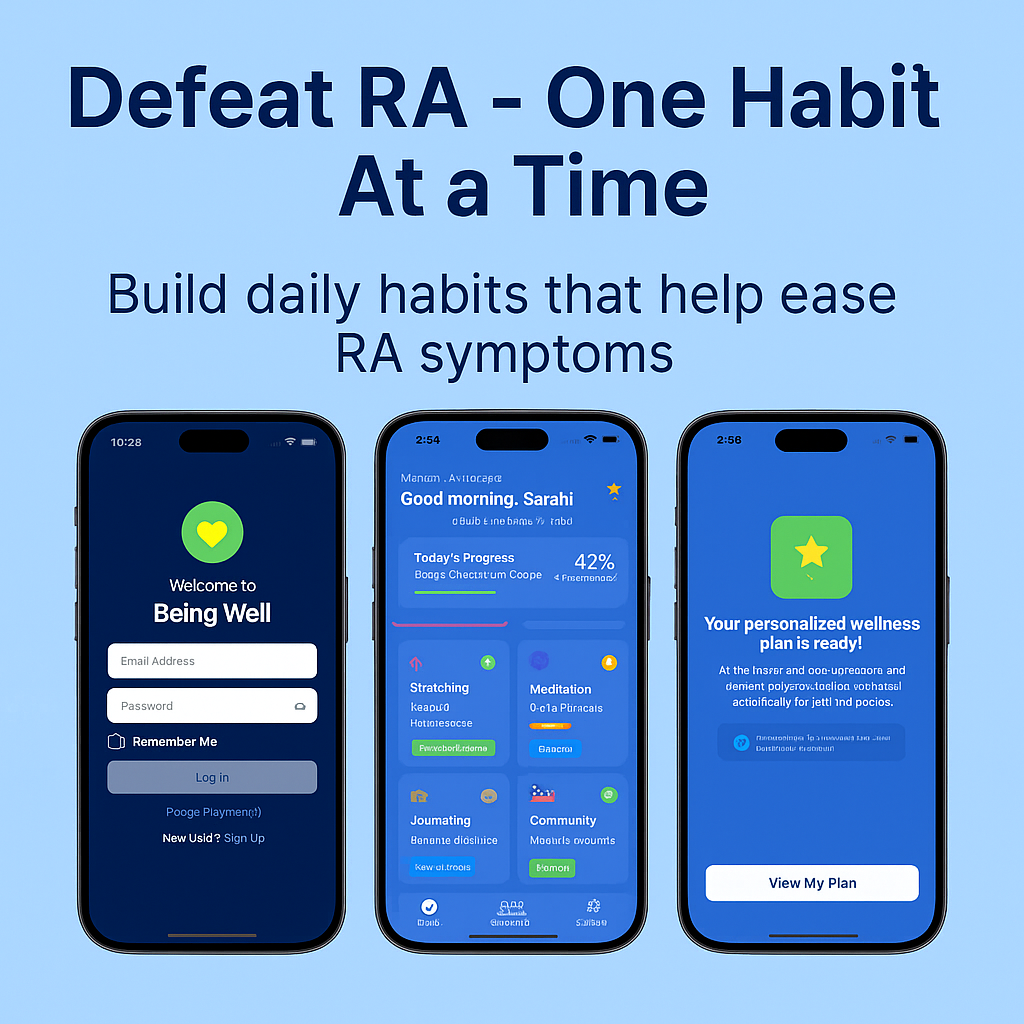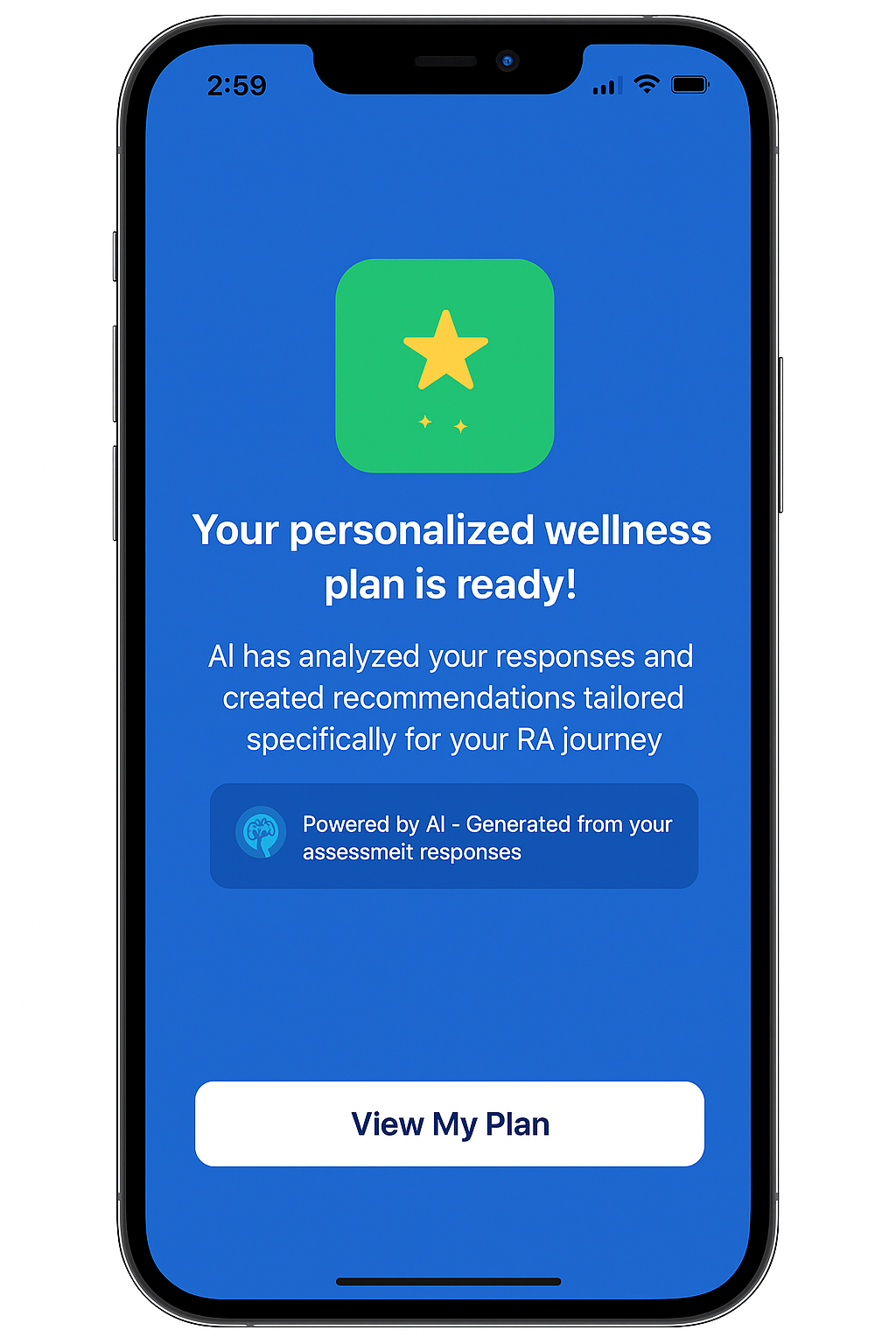Brain Fog and RA Medications: A Complete Guide
💡 Struggling with brain fog? The free BeingWell app helps you build daily habits proven to reduce inflammation and improve focus.
Living with rheumatoid arthritis (RA) is challenging enough without the added hurdle of brain fog. Many people taking medications for RA notice periods where they have difficulty concentrating, memory problems, thinking feels slower, or they simply feel "out of it." While this can be unsettling, understanding why it happens and how to manage it can make a big difference.
This guide explains why it happens (side effects, immune changes, RA itself, sleep/fatigue), how long it lasts (often temporary, sometimes persistent), and strategies to manage it. Practical tips include adapting work and home routines, using reminders and checklists, optimizing sleep, and making lifestyle adjustments in nutrition, hydration, sleep and exercise.
What Is Brain Fog on RA Medications?
Brain fog isn't a medical diagnosis, but rather a collection of cognitive symptoms that many people with rheumatoid arthritis experience, particularly when taking certain medications. Common symptoms include:
Common Brain Fog Symptoms:
- Difficulty concentrating
- Forgetting simple things (like where you put your keys)
- Feeling mentally sluggish or just tired
- Struggling to follow complex conversations
- Forgetting appointments or daily tasks
These symptoms can interfere with work, relationships, and daily life. It's even worse when the pain, flareups and fatigue from RA surface.
Want to track sleep & hydration with reminders? Sign up here.
Why Does Brain Fog Happen?
There are several reasons RA medications may contribute to brain fog:
Medication Side Effects
Drugs like methotrexate, biologics, or corticosteroids can affect the nervous system or alter sleep, mood, and energy, which trickles down to cognition. Methotrexate can be particularly impactful here as it affects folate metabolism, which is crucial for brain function and neurotransmitter production. Even with folic acid supplementation, some people experience cognitive effects.
Immune System Changes
Chronic inflammation itself affects brain function. RA medications suppress parts of the immune system to reduce inflammation. This immune shift can sometimes influence brain function.
RA Itself
Chronic inflammation is linked to fatigue and mental fog, so sometimes it's not the medication alone but RA plus the treatment.
Sleep and Fatigue
Pain, disrupted sleep, stress, and fatigue worsen brain fog, and medications may amplify this.
How Long Will It Last?
Brain fog is often temporary and varies by person. For some, it's most noticeable when starting a new medication or adjusting dosage. In many cases:
Short-term Side Effect
For many people, fog may improve within 3 to 6 months as the body adjusts. In some cases - some people experience ongoing cognitive effects while taking the medication.
Persistent but Manageable
In many cases - brain fog will improve on its own, as your body adjusts to the medication your doctor has prescribed, usually 3 to 6 months. Others have experienced improvement in brain fog and inflammation through lifestyle changes such as nutrition, hydration, sleep and exercise.
Other Factors
The higher dosage, the older the patient and poorer the lifestyle habits (e.g., sleep, diet, exercise, hydration) the more severe and long lasting the symptoms.
Important Note:
It is extremely important to keep your rheumatologist aware of the symptoms you are feeling, especially if they're severe, worsening or last longer than a few months.
Adapting Work and Daily Responsibilities
Instead of fighting through brain fog, adapt your environment and habits!
Schedule Your Tasks
- Schedule complex tasks during your mentally sharpest times (often mornings)
- Use afternoons for routine or less demanding activities
- Block calendar time for focused work without interruptions
Use Lists and Reminders
Create checklists, reminders, calendars, alarms, or sticky notes to keep track of tasks.
Batch Routine Tasks
Grouping chores or errands reduces decision fatigue.
Ask for Flexibility
If possible, arrange work-from-home days or flexible hours.
Inform Colleagues and Friends
Informed family, friends and colleagues will be better able to support you.
Ask for HELP
Don't be afraid to delegate and ask friends for help!
Make these strategies automatic.
The BeingWell app turns your plan into daily nudges with gentle reminders and streak tracking.
Get early accessAt Work
- Ask for meeting agendas in advance to prepare mentally
- Take notes during meetings and confirm action items via email
- Use "I need to check my notes and get back to you" as a standard response
- Consider recording important meetings (with permission) for later review
- Reduce your cognitive load: delegate whatever you can, create recurring weekly menus, automate payments, grocery / delivery services etc.
At Home Organization Systems
- Designate specific spots for keys, phone, wallet
- Use phone alarms for medication reminders and appointments
- Create visual reminders (sticky notes, phone wallpapers)
- Batch similar tasks together (all errands in one trip)
Manage Brain Fog Through Lifestyle Modifications
In addition to medication management, adopting these lifestyle habits can help prevent inflammation and support your body in managing brain fog and flare-ups:
🥗 Nutrition
Avoid inflammatory foods like gluten, dairy, and processed foods, while adding anti-inflammatory options like vegetables, fruits, and lean proteins.
💧 Hydration
Stay hydrated with about 100 ounces of water daily. Start your morning with several large glasses, then pace intake throughout the day to keep joints lubricated.
😴 Sleep
Aim for 8 hours of quality sleep each night. Keep a consistent schedule and create a calm, cool, dark environment.
🏃 Exercise
Improve blood flow through light stretching and exercise. Start small to avoid injury, then gradually increase.
For the full 8-pillar guide to RA wellness:
👉 Wellness Pillars Overview – RA Management Guide ↗Start making these lifestyle modifications today using our Wellness Habit Tracker.
Or, use your app - sign up here!

Join the waitlist for the BeingWell app
⭐ Free forever plan • No credit card required • Cancel anytime
